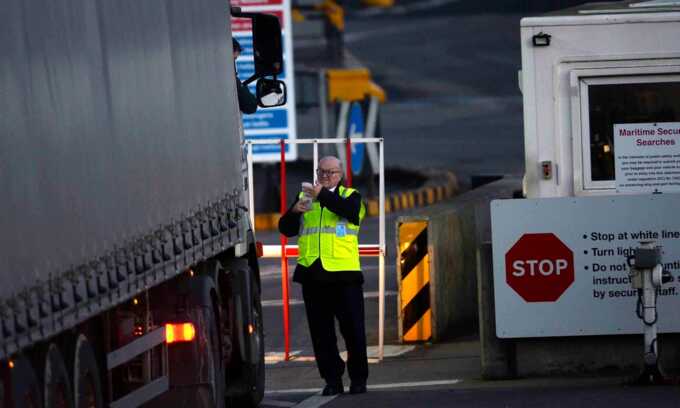UK’s ‘not for EU’ meat and dairy labelling plan postponed indefinitely

Policy devised under the Conservatives to be reviewed after warnings of potential chaos for producers and suppliers
Government plans to force food manufacturers to put “not for EU” labels on all meat and dairy products sold across Britain next month have been indefinitely postponed after warnings that the scheme could cause “chaos” for producers and suppliers.
The government will instead review the policy, which was devised under the Conservative administration. Legislation to implement the changes has yet to be brought in.
The Food and Drink Federation had estimated the cost to the industry of meeting the new labelling requirements at up to £250m a year, and warned that it would increase the price of products for shoppers.
As part of the Windsor framework agreed with the EU last year, all meat and dairy products sent from Britain to be sold in Northern Ireland have since October 2023 had to carry a “not for EU” label.
The measure is designed to prevent goods from bypassing EU controls by being sent to the Republic of Ireland, which does not have a hard border with custom checks on goods coming from Northern Ireland.
The labelling was due to be extended to all meat and dairy products sold in Britain from October, as part of the “safeguarding the union” deal with the Democratic Unionist party that was agreed in January. Fruit and vegetables, fish, and composite food products such as pizza, were intended to be labelled by July 2025.
The previous government said the labels would be needed “to ensure no incentive arises for businesses to avoid placing goods on the Northern Ireland market”, and those in Northern Ireland had the same access to goods in the rest of the UK.
A consultation was run during February and March but the results were never published and businesses have been left in the dark about whether the October plan would remain.
Some trade bodies criticised the consultation, saying the government had already decided on the implementation and that the process was a “glorified impact assessment”.
A letter this month from the Provision Trade Federation, which represents food producers, to the environment secretary, Steve Reed, said the lack of clarity was “extremely unsatisfactory” and had left the industry in “complete limbo”.
It said the uncertainty had created a situation where some retailers were already requiring suppliers to reformat packaging to meet the October deadline, resulting in added costs, while others had not made any changes owing to the uncertainty.
The letter, which was signed by several other bodies including the National Farmers’ Union, Dairy UK and the Food and Drink Exporters Association, urged the government to abandon the plan, or at least put in place a six-month delay to help businesses to prepare.
The letter said: “We would strongly urge you to draw a line under this poorly handled chapter and make the earliest possible announcement to that effect.”
A spokesperson for the Department for Environment, Food and Rural Affairs said: “Ministers are carefully considering the evidence provided in the recent ‘not for EU’ labelling consultation.
“We are committed to taking all necessary steps to protect the UK internal market and are continuing to engage with businesses to ensure the smooth flow of goods to Northern Ireland.”
Judith Bryans, the chief executive of Dairy UK, said she welcomed the announcement that the marking requirement would no longer be rolled out in October.
“Had this initiative gone ahead with new labels being required on pack by 1 October, it would have resulted in chaos for dairy and added significant unnecessary cost and a huge admin burden to businesses,” she said.
The main concerns from businesses that sell to the UK and the EU is that the upheaval to production the changes will create, with many having to run two separate production lines for products for both regions.
Read more similar news:
Comments:
comments powered by Disqus

































